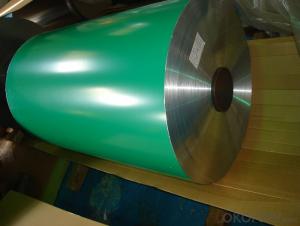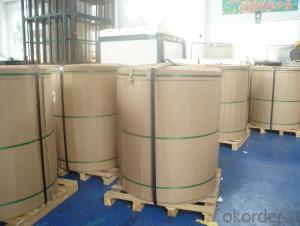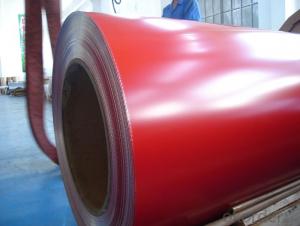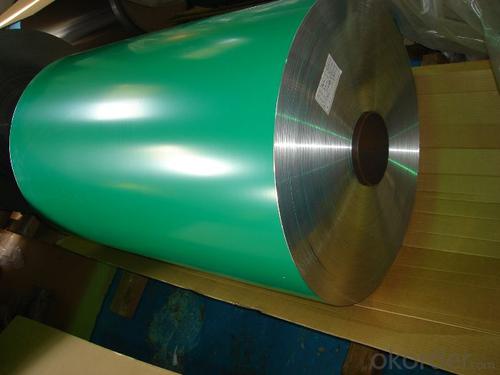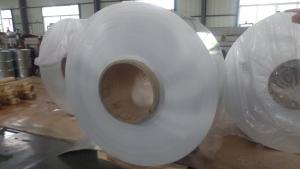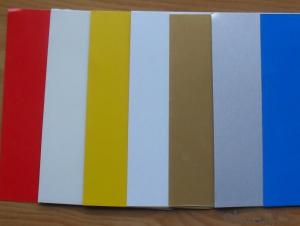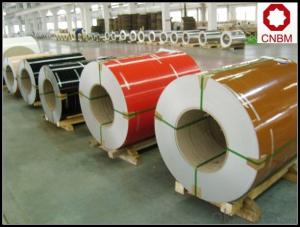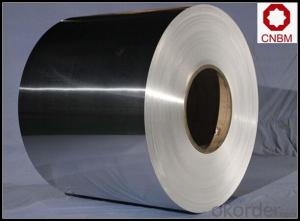Hot Rolled Aluminum Coil 5182 H48 Aluminum Can Tab Materials with Different Colors
- Loading Port:
- Shekou
- Payment Terms:
- TT OR LC
- Min Order Qty:
- 5 m.t.
- Supply Capability:
- 100000 m.t./month
OKorder Service Pledge
OKorder Financial Service
You Might Also Like
1.Structure of Aluminum Can Tab Materials 5182 H48 with Different Colors
We normally use 5182, H48 to produce coated aluminum coils, which are widely used in aluminum can tabs or ring-pulls. Based on ordinary aluminum, we add Mn and Mg, so as to increase tensile strength and elongation.
We have different colors for tabs, such as blue, red, transparent, etc. We also can adjust coating according to color of customers and offer personalized services.
We use large wave shear, transverse shear and longitudinal cut system so as to meet different specifications of customers.
2. Main Features of Aluminum Can Tab Materials 5182 H48 with Different Colors
• Light Weight
• High Flatness
• Good Weathering
• Colorful
• Recycling
• Saving Energy
• Rustproof
3. Aluminum Can Tab Materials 5182 H48 with Different Colors Images
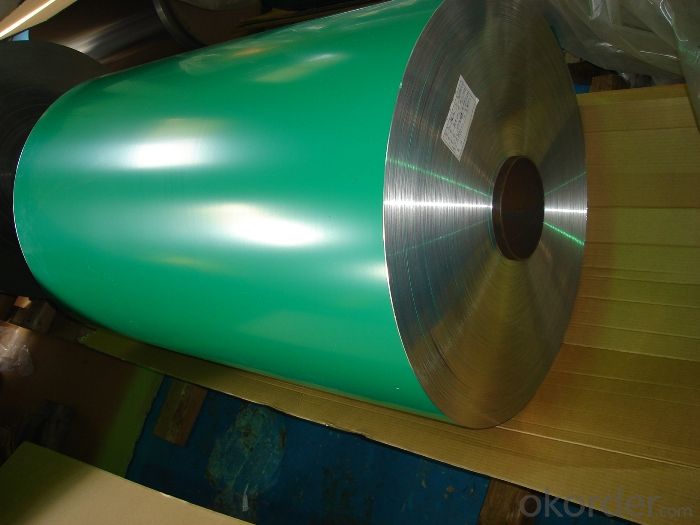
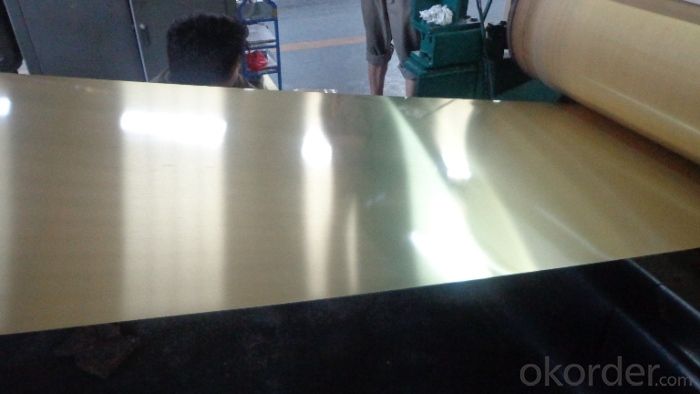
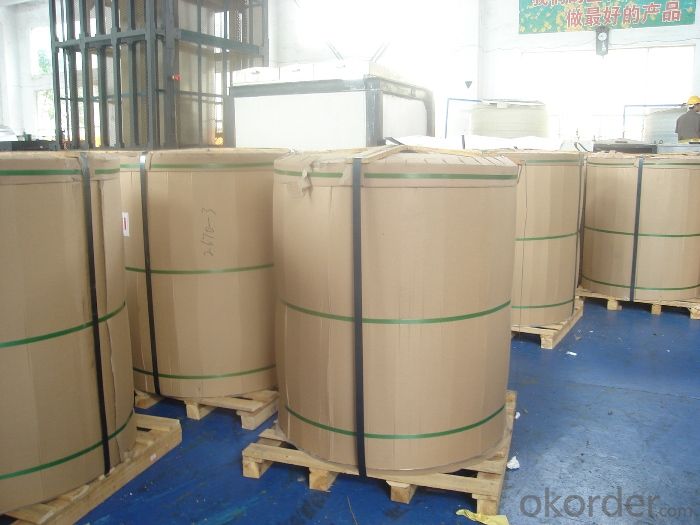
4. Specification of Aluminum Can Tab Materials 5182 H48 with Different Colors
ALLOY | TEMPER | THICKNESS | WIDTH | COIL OR LENGTH |
5052 5182 | H19 H36 H48 H49 | 0.22-0.5mm | 500-1600mm | AS PER YOUR REQUIREMENTS |
5. FAQ
A.What about inspections to guarantee quality?
For each order, we will arrange strict inspection for raw materials, inspection during production and inspection for finished goods.
With requirement of customers, we also can arrange the third party inspection.
B.What about delivery?
We will put order in production schedule after order gets confirmed against copy of TT or L/C. Normally it takes about one month for production. Exact shipment schedule is different based on different sizes and quantity.
C.What is the MOQ?
5 tons for each size.
D. Where have you exported?
We have exported to many countries. Main markets include South East Asia, Middle East, North America, South America, etc.
- Q: Are aluminum coils suitable for lightweight panel applications?
- Yes, aluminum coils are suitable for lightweight panel applications due to their inherent lightweight nature and high strength-to-weight ratio. Additionally, aluminum coils offer excellent corrosion resistance, making them a reliable choice for various lightweight panel applications.
- Q: Can aluminum coils be used for industrial piping?
- Yes, aluminum coils can be used for industrial piping. Aluminum is a versatile and lightweight material that offers several advantages for industrial piping applications. It has excellent corrosion resistance, which makes it suitable for various industries, including chemical, petrochemical, and food processing. Aluminum coils are also easy to work with and can be formed into different shapes and sizes, allowing for flexibility in designing and installing piping systems. Additionally, aluminum has good thermal conductivity, which is beneficial for applications that require heat transfer. However, it is important to consider the specific requirements of the industrial process and consult with experts to ensure that aluminum coils are suitable for the intended application.
- Q: im looking for a bat but i dont know what to get wood or aluminum what is harder wood or aluminum ?? what would be better for hitting hard balls with ( or maybe people ) haha no im joking i need help !!!!
- why dont get wack each one over your head and see which hurts more. than you'll get your answer, just kidding. you should know metal is always harder than wood. but for baseball, you want a wooden bat, better for the swing, and the grip. I used to play little league back in the day and used aluminum bats, and even with batting gloves my hands were always killing me after the game.
- Q: What are the common recycling methods for aluminum coils?
- There are several common recycling methods for aluminum coils. One of the most widely used methods is mechanical recycling, which involves shredding the aluminum coils into small pieces and then melting them down to form new aluminum coils. This method is efficient and cost-effective, as it allows for the reuse of the aluminum material without compromising its quality. Another method is called pyrolysis, which involves heating the aluminum coils at high temperatures in the absence of oxygen. This process breaks down the aluminum into its constituent elements, allowing for the recovery of valuable metals and other byproducts. Chemical recycling is another method that can be used for aluminum coil recycling. This involves dissolving the aluminum coils in a chemical solution to separate the aluminum from other materials. The resulting aluminum can then be used to manufacture new coils. Finally, there is also a method called smelting, which involves melting the aluminum coils and separating impurities through a process called electrolysis. This method allows for the recovery of pure aluminum, which can be used to make new coils. Overall, these recycling methods help to reduce the environmental impact of aluminum coil production by conserving resources and minimizing waste. They also contribute to the sustainability of the aluminum industry by promoting the reuse of materials and reducing the need for virgin aluminum production.
- Q: What are the potential applications of coil-annealed aluminum coils?
- Coil-annealed aluminum coils possess a wide array of potential applications across diverse industries. One example lies within the automotive sector, where these coils can be utilized to fabricate lightweight parts and components for vehicles. The inherent lightness of aluminum renders it an ideal material for enhancing fuel efficiency and reducing emissions. This makes it possible to manufacture body panels, chassis components, and structural parts for automobiles. Another field that can benefit from coil-annealed aluminum coils is the construction industry. These coils can be employed in the production of roofing, siding, and wall cladding materials. The corrosion-resistant properties of aluminum render it a suitable choice for applications exposed to outdoor elements, where durability is paramount. Furthermore, the lightweight nature of aluminum simplifies handling and installation, thereby mitigating labor and transportation costs. The packaging industry also holds promise for coil-annealed aluminum coils. Aluminum proves to be an excellent material for food and beverage packaging due to its non-toxic, odorless, and impermeable attributes. Consequently, these coils can be utilized to manufacture cans, foil wraps, and pouches, providing a safe and hygienic packaging solution. Furthermore, the electrical and electronics industry can leverage coil-annealed aluminum coils. Aluminum boasts exceptional electrical conductivity, making it suitable for power transmission lines, electrical components, and heat sinks for electronic devices. Its lightweight nature further facilitates handling and installation in various electrical applications. In summary, coil-annealed aluminum coils offer versatility, durability, and lightweight properties that make them an excellent choice for a multitude of manufacturing needs across various industries. From automotive to construction, packaging to electrical, the applications for these coils are diverse and far-reaching.
- Q: I want to roll aluminum rolls and operate the machine for more than three years
- (2) shutdown leaves firewood period (during inductrial injury treatment and rehabilitation) according to the original wage compensation;
- Q: Can aluminum coils be used in high-radiation environments?
- Aluminum coils can be used in high-radiation environments, but their performance and durability may be affected depending on the level of radiation exposure. Aluminum is a relatively good conductor of heat and electricity, making it a suitable material for many applications, including coil systems. However, when exposed to high levels of radiation, aluminum can become more susceptible to degradation and corrosion. In high-radiation environments, the primary concern is the potential for radiation-induced damage to the material. Aluminum is considered to have relatively low radiation resistance compared to other metals, such as stainless steel or titanium. As a result, prolonged exposure to high radiation levels can lead to structural changes, including embrittlement and loss of mechanical properties. To mitigate these risks, several factors need to be considered. The specific radiation level, duration of exposure, and the intended application of the aluminum coils are critical in determining their suitability for use in high-radiation environments. Additionally, protective coatings or treatments can be applied to enhance the radiation resistance of the aluminum coils, increasing their durability and longevity. Ultimately, the decision to use aluminum coils in high-radiation environments should be based on a thorough assessment of the radiation levels, the potential risks, and the specific requirements of the application. Consulting with radiation experts and considering alternative materials may be necessary to ensure the best performance and safety in such demanding conditions.
- Q: Are there any limitations on the length of aluminum coils?
- Yes, there are limitations on the length of aluminum coils. The length of aluminum coils is typically limited by practical considerations, such as transportation and handling capabilities. Additionally, longer coils may become more susceptible to bending, warping, or other forms of damage. Consequently, manufacturers often have specific maximum length specifications for aluminum coils.
- Q: i know that your not suppose to use DC for aluminum only with AC but is it possible?
- Yes it is possible. You would need helium for the shielding gas instead of argon.
- Q: What are the typical delivery methods for aluminum coils?
- The typical delivery methods for aluminum coils vary depending on the size and quantity of the coils being transported. However, there are a few common delivery methods that are often used in the industry. One of the most common methods is by truck. Aluminum coils are usually transported on flatbed trucks, which provide a secure and stable platform for the coils during transit. This method is suitable for both short and long-distance deliveries, and it allows for easy loading and unloading of the coils at the destination. Another common delivery method is by rail. Rail transportation is often used for larger quantities of aluminum coils or when the delivery distance is significant. Rail cars equipped with flatbeds or specialized coil cars are used to transport the coils safely and efficiently. This method is particularly advantageous for long-distance deliveries, as it is generally more cost-effective and environmentally friendly compared to other modes of transportation. In some cases, aluminum coils may also be delivered by sea. This method is typically used for international shipments or when the coils need to be transported over long distances. Coils are usually packed into containers, securing them during the journey and protecting them from any potential damage. Shipping by sea allows for efficient transportation of large quantities of coils, but it may take longer compared to other delivery methods due to customs procedures and port handling. Lastly, smaller quantities of aluminum coils can be delivered by air freight. This method is often used when time is critical or for urgent shipments. Airplanes equipped with cargo holds are used to transport the coils, ensuring their safe and expedited delivery. However, air freight is generally more expensive than other delivery methods, so it is typically reserved for time-sensitive or high-value shipments. Overall, the typical delivery methods for aluminum coils include truck, rail, sea, and air. The selection of the appropriate method depends on various factors such as the size, quantity, distance, urgency, and cost considerations.
Send your message to us
Hot Rolled Aluminum Coil 5182 H48 Aluminum Can Tab Materials with Different Colors
- Loading Port:
- Shekou
- Payment Terms:
- TT OR LC
- Min Order Qty:
- 5 m.t.
- Supply Capability:
- 100000 m.t./month
OKorder Service Pledge
OKorder Financial Service
Similar products
Hot products
Hot Searches
Related keywords
